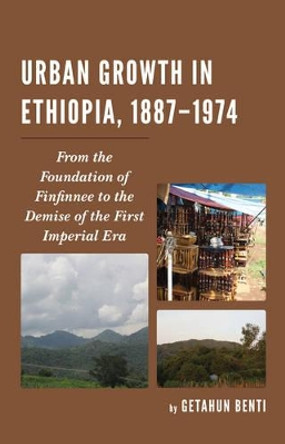Description
About the Author
Getahun Benti is associate professor of African history at Southern Illinois University at Carbondale.
Reviews
Getahun Benti's book is so far one of the major research outputs published on the history of urbanism and urban growth in Ethiopia. . . . The author's methodological sophistication deserves appreciation. Getahun extensively exploited various sources to substantiate his analysis. The lucidity and beauty of its language and neatness to address complex issues is quite attractive and a joy to read. * African Studies Quarterly *
Benti (African history, Southern Illinois Univ. at Carbondale) combines chronological/historical, regional, and demographic approaches to Ethiopian urbanization. Such a holistic orientation presents an integrated narrative that allows readers to better comprehend the course and nature of Ethiopian urban growth. The author's Oromo origins, however, reflect a southern Ethiopian rather than an Amhara/Tigray perspective. Benti believes that most scholarly studies on Ethiopia have focused heavily on the north, which has politically and militarily dominated Ethiopia during the period under consideration in this volume. The author strives to correct this imbalance. On a superficial level, he has chosen to use Oromo place names such as Finfinnee, rather than Addis Ababa. At a deeper level, he pays more attention to the southern Oromia towns rather than the northern Amhara/Tigray towns. He argues that this is valid because of the south's size and its demographic and economic importance relative to the other regions. Benti consults the available secondary literature, a number of elderly informants, and, most importantly, the BA and MA theses of Addis Ababa University history students who, in order to compete their degrees, were encouraged to return to their homes and write accounts of their histories. These students used local archives and local informants. Summing Up: Recommended. Upper-division undergraduates and above. * CHOICE *
Professor Benti's book is useful for educators, politicians, activists, and students who want to understand the role of Finfinnee (Addis Ababa) in particular and other garrison cities in general in the Ethiopian Empire in maintaining colonial domination and the subordination of the Oromo nation, the largest ethno-national group in Ethiopia, and their national struggle to restore the ownership of this capital city in the heart of their country. By providing an alternative explanation to Ethiopian studies that have treated the Oromo as objects of history by denying them agency and the ownership of their towns, the book also demonstrates the contradiction between Oromo history and Ethiopian history by focusing on the agency of the Oromo. Consequently, the book further enriches our knowledge on Oromo and urban studies in Northeast Africa. -- Asafa Jalata, University of Tennessee-Knoxville
The best survey yet and a much-needed contribution to an important set of modernization, urbanization, and exploitation in Ethiopian history. Benti produced a comprehensive, analytical, and balanced work that will have a long-lasting shelf life. -- Tsega Etefa, Colgate University
The best survey yet and a much-needed contribution to an important set of modernization, urbanization, and exploitation in Ethiopian history. Benti produced a comprehensive, analytical, and balanced work that will have a long-lasting shelf life. -- Tsega Etefa, Colgate University
Benti has written a seminal book that is a veritable touchstone for understanding the complex process of urbanization in Ethiopia from the foundation of Finfinnee to the demise of the First Imperial Era, 1887-1974. With remarkable virtuosity, he deploys a broad range of extant historical sources to analyze the nexus between imperial expansion, economic development and the consequential growth of towns and cities. The book provides both a nuanced assessment of the factors that facilitated the emergence of urbanization in Ethiopia and the policies that have hindered the transition to a fully developed modern country. The book is a tour de force that should be a template for examining the process of urbanization in other African countries. -- Ezekiel Walker, University of Central Florida
Getahun Benti's Urban Growth in Ethiopia is a valuable contribution to the history of urbanization in Ethiopia. It documents and critically examines the impressive progress and the factors that impeded a transition to fully urbanized modern economy and society in Ethiopia. The book is based on the author's many years of research on urban issues and his intimate knowledge of the landscape and the rich unpublished archival data in Ethiopia. -- Guluma Gemeda, University of Michigan, Flint
Book Information
ISBN 9781498521956
Author Getahun Benti
Format Paperback
Page Count 232
Imprint Lexington Books
Publisher Lexington Books
Weight(grams) 354g
Dimensions(mm) 221mm * 153mm * 17mm






